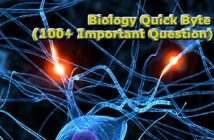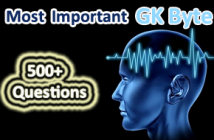Friends, below are the list of important MCQs of Punjab State Teacher Eligibility Test  (PSTET) – Child Development and Pedagogy
- Child Development (Primary School Child)
- Concept of Inclusive education and understanding children with special needs
- Learning and Pedagogy.
Request – If you get any answer wrong. please let us know, we will correct it
Practice Set – 1 | Practice Set – 2 | Practice Set – 3 | Practice Set – 4 | Practice Set -5 | Practice Set – 6
Q-1 Which of the following is the true statement in reference to Intelligence?
a) Intelligence is the ability to adjust
b) Intelligence is the ability to learn
c) Intelligence is the ability of Abstract Reasoning
d) All of these
Q-2 What should be the role of teacher in meeting the individual differences?
a) Try to know the abilities, interest and aptitude of individuals
b) Try to adjust the curriculum as per the needs of individuals
c) Both a) and b)Â
d) None of these
Q-3 Which of the following is not the tool for Formative Assessment in sholastic domain?
a) Conversation Skill
b) Multiple Choice Question
c) Projects
d) Oral Questions
Q-4 A few students in your class are exceptionally bright, you will teach them–
a) Along with the class
b) Along with higher classes
c) By using Enriched programmesÂ
d) Only when they want
Q-5 The major purpose of diagnostic test is that of identifying–
a) The General area of weakness in class performance
b) Specific nature of remedial Programme needed
c) The causes underlying academic difficulties –
d) The specific nature of pupil difficulties
Q-6 Special education is related to–
a) Educational for talented students
b) Educational programmes for disabledÂ
c) Training programmes for Teachers
d) Training programme for retarded
Q-7 In CCE, Formative and Summative Assessment totals to–
a) 40% and 60% respectivelyÂ
b) 60% and 40% respectively
c) 50% and 50% respectively
d) None of the above
Q-8 Which article enjoins that “All minorities whether based on religion or language shall have the right to establish and administer education institutions of their choice” ?
a) Article 28
b) Article 29
c) Article 30
d) Article 32
Q-9 As a teacher what techniques you would follow to motivate students of your class–
1. By setting induction
2. Use of black board
3. By illustration
4. By active participation of students
a) 1, 2 and 3
b) 1 and 4
c) 2 and 4
d) All of these
Q-10 Which of the following is a principle of development?
a) It does not proceed at the same pace for all
b) Development is always linear
c) It is a discontinuous process
d) All processes of development are not inter-connected
Q-11 Human development is divided into domains such as
a) physical, cognitive, emotional and social
b) emotional, cognitive, spiritual and social-psychological
c) psychological, cognitive, emotional and physical
d) physical, spiritual, cognitive and social
Q-12 A teacher uses a text and some pictures of fruits and vegetables and holds a discussion with her students. The students link the details with their previous knowledge and learn the concept of nutrition. This approach is based on
a) Classical conditioning of learning
b) Theory of reinforcement
c) Operant conditioning of learning
d) Construction of knowledge
Q-13 A child starts to cry when his grandmother takes him from his mother’s lap. The child cries due to
a) Social anxiety
b) Emotional anxiety
c) Stranger anxiety
d) Separation anxiety
Q-14 Which of the following is a teacher-related factor affecting learning?
a) Proper seating arrangement
b) Availability of teaching -learning resources
c) Nature of the content or learning experiences
d) Mastery over the subject-matter
Q-15 According to Kohlberg, a teacher can instill moral values in children by
a) giving importance to religious teachings
b) laying clear rules of’ behaviour
c) involving them in discussions on moral issues
d) giving strict instructions on ‘how to behave’
Q-16 Young learners should be encouraged to interact with peers in the classroom so that
a) they can learn answers to questions from each other
b) the syllabus can be covered quickly
c) they learn social skills in the course of study
d) the teacher can control the classroom better
Q-17 When a child with a disability first comes to school, the teacher should
a) refer the child to a special school according to the disability
b) seclude him from other students
c) discuss with the child’s parents to evolve collaborative plans
d) conduct an admission test
Q-18 According to Piaget’s stages of Cognitive Development, the sensori-motor stage is associated with
a) imitation, memory and mental representation
b) ability to solve problems in logical fashion
c) ability to interpret and analyse options
d) concerns about social issues
Q-19 Human personality is the result of
a) upbringing and education
b) interaction between heredity and environment
c) only environment
d) only heredity
Q-20 Individual attention is important in the teaching – learning process because
a) learners always learn better in groups
b) teacher training programmes prescribe it
c) it offers better opportunities to teachers to discipline each learner
d) children develop at different rates and learn ‘differently
Q-21 Which of the following is the first step in the scientific method of problem-solving?
a) Verification of hypothesis
b) Problem awareness
c) Collection of relevant information
d) Formation of hypothesis
Q-22 Which of the following is a domain of learning?
a) Experiential
b) Affective
c) Spiritual
d) Professional
Q-23 When a child gets bored while doing a task, it is a sign that
a) the task may have become mechanically repetitive
b) the child is not intelligent
c) the child is not capable of learning
d) the child needs to be disciplined
Q-24 Errors of learners often indicate
a) how they learn
b) the need for mechanical drill
c) absence of learning
d) socio-economic status of the learners
Q-25 The process whereby the genetic factors limit an individual’s responsiveness to the environment is known as
a) Discontinuity
b) Differentiation
c) Range of reaction
d) Canalization
Q-26 What are the factors related to learner that effects the learning?
a) Physical and Mental health of the learner
b) Level of aspiration and achievement motivation
c) Readiness and Willpower
d) All of these
Q-27 Creative writing should be an activity planned for–
a) Only those children reading on grade level
b) Only those children spell and write cohesive sentences
c) Only those children who want to write for newspaper
d) All children
Q-28 Which of the following are the External Factors affecting the interest of students in classroom?
a) Emotions and Sentiments
b) Culture and Training
c) Attitudes of students
d) Goals and motives
Q-29 An intelligent student is not doing well in studies. What is the best course of the action for the teacher?
a) Wait till he performs better
b) Find out reason for his under achievementÂ
c) Give him grace marks in the examination
d) Ask his parents to withdraw from school
Q-30 The term Identical Elements is closely associated with–
a) Similar test questions
b) Jealousy between peersÂ
c) Transfer of learning
d) Group Instructions
Q-31 It is said that teacher should be resourceful, This means that–
a) He should have enough money and property so that he may not have to take up tuitions
b) He should have contacts with high authorities so that he may not be harmed
c) He should have adequate knowledge so that he may be able to solve the problems of students-
d) He should have good reputation among students so that authorities may not be able to take any punitive measure against him
Q-32 Which of the following Motives are considered as primary motives?
a) Physiological Motives
b) Psychological Motives
c) Social Motives
d) Educational Motives
Q-33 In the context of education, socialization means
a) creating one’s own social norms
b) respecting elders in society
c) adapting and adjusting to social environment
d) always following social norms
Q-34 All of the following can be signs that a child is gifted, except
a) Interest in encyclopaedia and dictionaries
b) Uneasy relationships with peers.
c) Early development of a sense of time
d) Easy retention of facts
Q-35 With the frequent use of brain storming method the teacher develops
a) Creativity
b) Intelligence
c) Perception
d) Memory
Q-36 In which stage is the Physical growth is rapid
a) Early childhood
b) Infancy
c) Adolescence
d) School age
Q-37 The two factor theory of intelligence was proposed by
a) Spearman
b) Wechsler
c) Piaget
d) Binet
Q-38 Who said this, “Child should be treated as child.”
a) Roussoue
b) WechslerÂ
c) Binet
d) Gagne
Q-39 Theory of multiple intelligence implies the following except
a) intelligence is a distinct set of processing operations used by an individual to solve problems.
b) disciplines should be presented in a number of ways
c) learning could be assessed through a variety of means
d) emotional intelligence is not related to IQ
Q-40 Smallest unit of meaning in a language is
a) syntax
b) morpheme
c) pragmatics
d) phoneme
Q-41 A school gives preference to girls while preparing students for a State level solo-song competition. This reflects
a) Global trends
b) Pragmatic approach
c) Progressive thinking
d) Gender bias
Q-42 Vygotsky emphasized the significance of the role played by which of the following factors in the learning of children ?
a) Hereditary
b) Moral
c) Physical
d) Social
Q-43 A teacher makes use of a variety of tasks to cater to the different learning styles of her learners. She is influenced by
a) Kohlberg’s moral development theory
b) Gardner’s multiple intelligence theory
c) Vygotsky’s socio-cultural theory
d) Piaget’s cognitive development theory
Q-44 A teacher never gives answers to questions herself. She encourages her students to suggest answers, have group discussions and adopt collaborative learning. This approach is based on the principle of
a) proper organization of instructional material
b) setting a good example and being a role-model
c) readiness to learn
d) active participation
Q-45 Term PSRN in development implies:
a) problem solving, reasoning & numeracy
b) problem Solving, relationship & numeracy
c) perceptual skill , reasoning & numeracy
d) perceptual skill , relationship & number
Q-46 Vgotsky proposed that Child Development is
a) Due to genetic component of culture
b) A product of social interaction
c) A product of formal education
d) A product of assimilation & accomodation
Q-47 Gardener formulated a list of seven intelligencies, which among the following is not one of them :
a) Spatial intelligence
b) Emotional intelligence
c) interpersonal intelligence
d) Linguistic intelligence
Q-48 Who was the pioneer of Classical Conditioning?
a) Skinner
b) PavlovÂ
c) Watson
d) Thorndike
Q-49 Which of the following statement is true in reference of intelligence :-
a) intelligence is the ability to adjust
b) intelligence is the ability to learn
c) intelligence is ability to abstract reasoning
d) Â All of these
Q-50 A child can think logically about object and event . This is the one reason of piaget of the stage :-
a) Sensory Motor
b) Pre Operational
c) Concrete Operational
d) Formal Operational
Request – If you get any answer wrong. please let us know, we will correct it
Practice Set – 1 | Practice Set – 2 | Practice Set – 3 | Practice Set – 4 | Practice Set -5 | Practice Set – 6




11 Comments
3 te 4 no ? da ans ki aave ga
please recheck question 30
right answer is option C
What is the answer of question no.3 and 5?
Pls check question no. 45 right answer is c
Question 3 ………….. answer is B